Night Parking Rules a Tax on the Poor?
Or good public policy? Reinstating night parking is a $13 million question for city.
In March the City of Milwaukee suspended most parking regulations as a result of drastically reduced travel early in the COVID-19 pandemic.
Now the Department of Public Works is struggling to put the genie back in the bottle.
DPW phased in metered parking regulations in June and brought back many parking regulations in early September. But a proposal to restore overnight parking regulations, and with it the alternate side parking requirement, is now stalled before the Common Council.
On Wednesday morning, Public Works Commissioner Jeff Polenske told the council’s Public Works Committee that the regulations generate approximately $4.5 million via night parking permits, $7 million in citations and $1.2 million from towing.
He said aside from the revenue issue, there are logistical issues as well. “Our operation does depend on having that alternate side parking so we can get to the curb,” said Polenske of the city’s leave pickup operation. He said the pickup keeps the streets clean and keeps leaves and other debris out of the storm sewers.
In addition to the Comptroller’s letter, maps were produced that show night parking citation distribution roughly matches the city’s population density (included below). The areas where vehicles are hit with the greatest number of overnight parking tickets are the East Side, Near West Side from Marquette University‘s Campus west towards N. 35th St., the Near South Side primarily between S. Cesar Chavez Dr. and S. Layton Blvd., the area around St. Joseph’s Hospital and the Riverwest–Harambee border along N. Holton St.
“The highest density areas on the west side of my district are also coincidentally areas with that have a high poverty rate,” said Alderman Robert Bauman, referring to the Near West Side in which he lives. “This is literally a tax on poor people.”
“What would you do if we don’t restore night parking?” asked Bauman. “Other cities don’t have this odd-even business and somehow they do something with their leaves.”
“The cities within the Midwest, I think we have somewhat comparable regulations when it comes to that,” said Polenske, rejecting Bauman’s premise.
“Obviously in the summer months there is less of an impact on the services we provide,” said Polenske. “Now that we’re in fall, that’s where our services are far more dependent on that opposite side operation.”
Ticket distribution ramps up in the winter months, said parking services manager Thomas Woznick. He said the city also sees a bump at the start of the year from people that don’t get a new annual overnight permit.
An overnight parking violation starts at $20 and grows to $50 after 58 days, said Woznick.
“At what point does that become tow eligible?” asked Ald. Khalif Rainey.
“Vehicles must have three or more open citations, all more than 65 days past due,” said Woznick, noting that they also must be illegally parked. Illegally parked vehicles that create a safety hazard are immediately towed. “We want people to get in a place where they are not tow-eligible. We don’t want to tow people.” He said people can enter a payment plan with a $10 down payment.
“I don’t see the rationale of putting this law back into place,” said Rainey, citing struggles with accessing unemployment and surging COVID-19 case counts.
“Has the pandemic hardship ended? Is that the position of the mayor that everyone is back to work, that they can pay their rent?” asked Bauman of Polenske. He argued that given the case counts, the city was more justified in relaxing the restriction now. “Your explanation for reinstating this has nothing to do with the pandemic, it has to do with revenue and collecting leaves.”
Budget director Dennis Yaccarino said the assumption was that when the regulations were suspended they would be restored later in the year. He estimated the cost to the 2020 budget would range from $5 million to $7 million if the regulations were soon reinstated. What happens if they’re not? “If this was not to pass what I would need is an amendment to reduce the budget $13 million.”
Mayor Tom Barrett‘s 2021 budget proposal, introduced last week, assumes the revenue is available in 2021. It could push the 2020 loss to $10 million, Yaccarino said.
The city transfers approximately $16 million each year from the transportation fund (permits, citations, meter revenue and parking structure revenue) to its general fund.
Bauman said the city could tackle that issue through the budget process. “I am inclined to not reinstate parking for the duration of 2020,” he said.
But aside from leaves, another operational issue looms in 2020.
Snow Plowing
Bauman said that what the council was debating was a regulation that would impact the present through December 1st, when snow regulations go into effect. “Clearly we need snow rules, that’s a matter of public safety,” he said.
But multiple DPW officials expressed concern that the snow regulations, which move select streets to alternate side parking, wouldn’t be sufficient and could lead to compounding problems.
“Keep in mind that the December 1st through March [regulations] are just for through highways,” said DPW operations manager Laura Daniels. She said select narrow streets are also included.
She said the city’s general plowing operations, which happen approximately 30 times a year, rely on the standard overnight rules. Streets are salted and light snow is plowed to the side. “We can’t do that if cars are parked on both sides of the street,” she said.
Questions remained unanswered on how snow-related regulations could be enforced if they relied on underlying parking regulations that were suspended.
Alderwoman JoCasta Zamarripa said she is already seeing issues with the lack of regulation, including an auto repair shop that has taken to parking vehicles on the street to the ire of neighbors. Bauman pointed out that her constituents are some of those most heavily ticketed. “This is a difficult issue all the way around,” she said.
Ald. Mark Borkowski moved to allow DPW to reinstate the regulations, but only found support from Zamarripa. Bauman and Ald. Russell W. Stamper, II voted no. Ald. Jose G. Perez abstained after asking if the measure could be held.
The vote punted the issue to the full Common Council. The full council will meet on October 13th and is expected to take the issue from committee to rule on the matter.
Temporary Restrictions
Bauman questioned Polenske about deploying temporary signage that would require people to move their vehicles on a specific day.
Polenske said the measure would require more staffing, and still wouldn’t necessarily be executed as expected. “It’s not a guaranteed service to say that we are going to be on the street on a given day,” said Polenske.
So what is the plan for leave pickup if the council doesn’t act? Plenty of leaves will have fallen by the October 13th vote.
“Plan B is we do the best we can,” said Polenske. He said if reinstated, DPW would do an education campaign to warn residents about the changes.
Citation and Population Density Maps
Legislation Link - Urban Milwaukee members see direct links to legislation mentioned in this article. Join today
If you think stories like this are important, become a member of Urban Milwaukee and help support real, independent journalism. Plus you get some cool added benefits.
Related Legislation: File 200638
More about the 2021 Milwaukee Budget
- City Hall: Council Delays on Federal COPS Grant - Jeramey Jannene - Nov 25th, 2020
- City Hall: Council Overrides One of Two Barrett Vetos - Jeramey Jannene - Nov 24th, 2020
- City Hall: Barrett Issues Two Budget Vetoes - Jeramey Jannene - Nov 18th, 2020
- City Hall: $1.6 Billion Adopted Budget Raises Fees, Cuts Police - Jeramey Jannene - Nov 6th, 2020
- Transportation: Budget Amendment Would Move Milwaukee Towards “Vision Zero” - Jeramey Jannene - Oct 30th, 2020
- City Hall: Committee Approves Over 20 Amendments To Milwaukee Budget - Jeramey Jannene - Oct 30th, 2020
- City Hall: Almost Half of Budget Amendments Are Policy Footnotes - Jeramey Jannene - Oct 29th, 2020
- City Hall: Community Groups Propose Changes - Jeramey Jannene - Oct 19th, 2020
- City Hall: City Could Lose 30 More Police Officers - Jeramey Jannene - Oct 19th, 2020
- Transportation: Should Milwaukee Stop The Hop? - Jeramey Jannene - Oct 13th, 2020
Read more about 2021 Milwaukee Budget here
Political Contributions Tracker
Displaying political contributions between people mentioned in this story. Learn more.
- December 13, 2018 - José G. Pérez received $50 from Mark Borkowski
- May 5, 2015 - José G. Pérez received $100 from JoCasta Zamarripa
City Hall
-
Attempt To Expand Disorderly Conduct Fine, Ban Bump Stocks Before RNC Fails
 Jul 11th, 2024 by Jeramey Jannene
Jul 11th, 2024 by Jeramey Jannene
-
Despite Losing Lawsuit, Coalition To March on RNC Will Proceed Without Permit
 Jul 9th, 2024 by Graham Kilmer
Jul 9th, 2024 by Graham Kilmer
-
Council Wants State to Ban Bump Stocks
 Jul 4th, 2024 by Jeramey Jannene
Jul 4th, 2024 by Jeramey Jannene
Transportation
-
MCTS Adds 28 New Buses
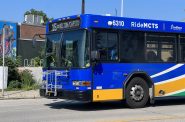 Jul 13th, 2024 by Graham Kilmer
Jul 13th, 2024 by Graham Kilmer
-
MCTS Designing New Bus Shelters
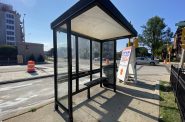 Jul 10th, 2024 by Graham Kilmer
Jul 10th, 2024 by Graham Kilmer
-
MCTS Updates RNC Bus Detours To Better Serve Downtown, Riders
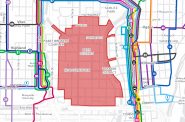 Jul 9th, 2024 by Jeramey Jannene
Jul 9th, 2024 by Jeramey Jannene


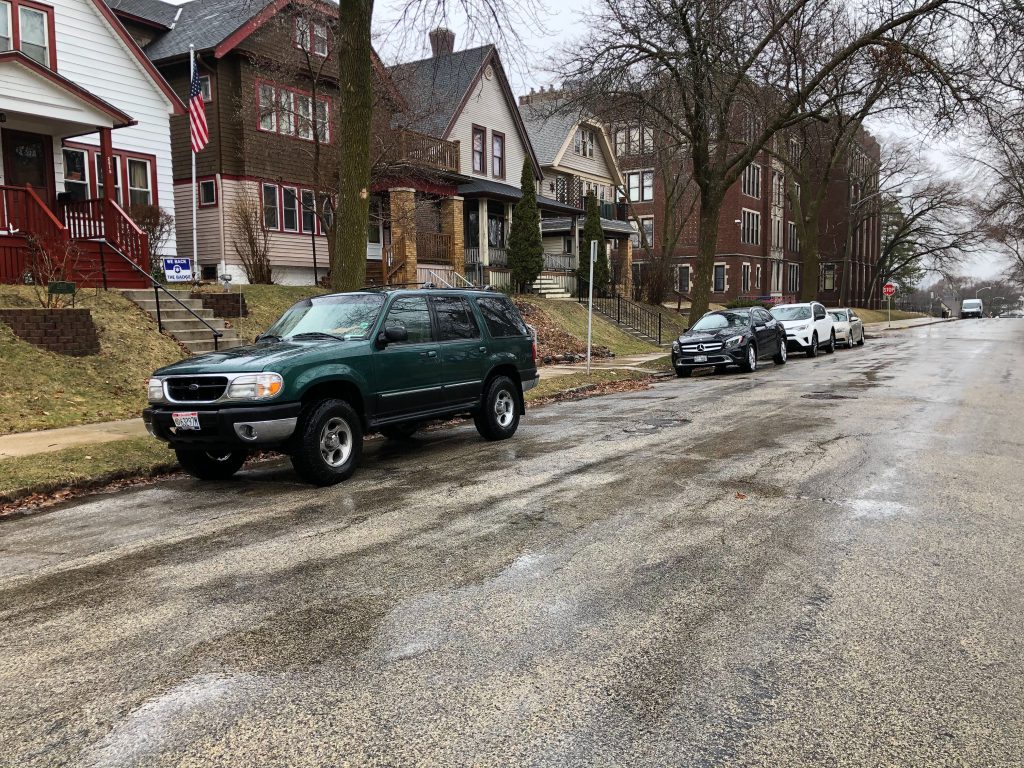
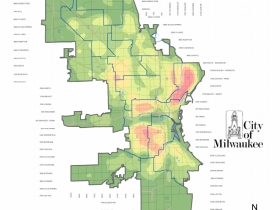
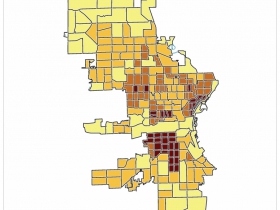
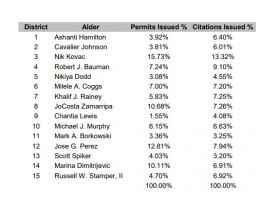




















One way to look at night parking fees (or any street parking fees) is as a user fee in exchange for the city having to provide and maintain lanes exclusively for parking. According to the DPW web site, there are 1,424 miles of paved streets. Assuming not all streets have parking lanes, and some only have one, a rough estimate would be about 2,000 lane-miles dedicated to parking.
If our society wasn’t so overly automobile dependent, this expense could be greatly reduced – and there would be more green space as less surface would need to be paved.
I do feel parking restrictions add an extra burden to the already overburdened. I remember what it was like to not have a garage to park in. I would be willing to pay a garage tax to make up for the 13 million.